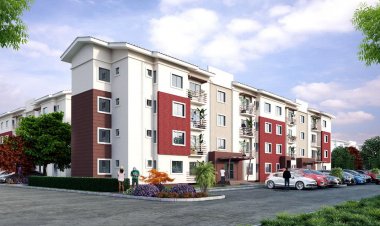Kenyan Property Market 2024: Evaluating Commercial vs. Residential Investments
Deciding between commercial and residential real estate depends on your investment goals and risk tolerance.

Kenya's real estate market in 2024 offers diverse opportunities for investors, but success hinges on choosing the right type of property. Developers and investors then grapple with this question: should they invest in commercial spaces like offices and retail stores or residential properties such as houses and apartments? Let’s delve into the pros and cons of each.
Residential Real Estate: Steady Growth, Lower Risk
Residential real estate encompasses homes where individuals and families live, including houses, apartments, and condominiums.
Benefits of residential real estate:
Lower Entry Point: Residential properties are generally more affordable than commercial ones, making them accessible to a broader range of investors.
Relatively Stable Demand: The constant need for housing ensures steady demand, making residential investments less volatile.
Easier Management: Managing residential tenants is often simpler compared to commercial tenants, with established legal frameworks for handling issues.
Challenges of residential real estate:
Lower Rental Yields: Residential properties usually offer lower rental returns compared to commercial investments.
Higher Management Costs: Frequent maintenance and management needs can lead to higher ongoing costs.
Slower Appreciation: While residential property values can appreciate, they typically do so at a slower rate than commercial properties.
Commercial Real Estate: Higher Yields, Higher Risks
Commercial real estate involves properties rented out to businesses, such as offices, retail stores, and warehouses.
Benefits of commercial real estate:
Potentially Higher Returns: Businesses typically pay higher rents than residential tenants, leading to potentially higher rental income.
Long-Term Leases: Commercial tenants often sign long-term leases, providing a stable and predictable income stream.
Growing Value: Commercial properties in high-demand business areas can appreciate significantly, similar to owning a highly coveted asset.
Challenges of commercial real estate:
Expensive Start: Commercial properties require a substantial upfront investment.
Vacancy Risks: Finding tenants for commercial spaces can be challenging, and vacancies can result in lost income.
Economic Sensitivity: Commercial real estate is more sensitive to economic fluctuations, which can impact demand for business spaces.
Kenya's Specific Market Landscape
The Kenyan real estate market in 2024 has unique considerations:
Economic Uncertainty: Rising inflation and interest rates present challenges for both commercial and residential investors.
Infrastructure Development: Government projects like the Standard Gauge Railway could boost demand for commercial spaces in specific areas.
Oversupply in Some Sectors: The Nairobi Metropolitan Area (NMA) may face an oversupply of office and retail space, affecting rental yields in those sectors.
Making Your Choice
Deciding between commercial and residential real estate depends on your investment goals and risk tolerance. If you’re inclined towards higher risks and potential high returns, commercial properties might be suitable. Conversely, if you prefer steady, safer investments, residential properties could be a better choice.
Consulting with a real estate expert in Kenya is crucial before making your decision. They can help you assess your risk tolerance, analyze specific properties, and develop an investment strategy tailored to your goals.
If you have a real estate press release or any other information that you would like featured on the African Real Estate Blog Post, do reach out to us via email at [email protected]





























![7 Famous Architectures in Africa [PHOTOS]](https://realestateblogpost.com/uploads/images/2023/05/image_380x226_646c9c2bd8642.jpg)



